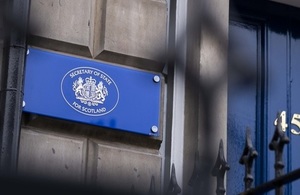Welcome to today’s briefing from Downing Street. I am joined by Dr Jenny Harries, the deputy chief medical officer.
First, I want to update you on the latest data on the coronavirus response.
2,489,563 tests for coronavirus have now been carried out in the UK, including 136,486 tests carried out yesterday;
240,161 people have tested positive, that’s an increase of 3,451 cases since yesterday;
10,484 people are currently in hospital with coronavirus, down 12% from 11,872 this time last week.
And sadly, of those tested positive for coronavirus, across all settings, 34,466 have now died. That’s an increase of 468 fatalities since yesterday. This figure is in all settings not just hospitals.
Before we begin questions from the public and from the media I want to remind people of the details of the next phase of our fight against coronavirus.
First, in order to monitor our progress, we are establishing a new COVID Alert Level System, with five levels, each relating to the level of threat posed by the virus.
The alert level will be based primarily on the R value and the number of coronavirus cases.
And in turn that alert level will determine the level of social distancing measures in place.
The lower the level, the fewer the measures; the higher the level, the stricter the measures.
Throughout the period of lockdown which started on 23 March we have been at Level 4.
Thanks to the hard work and sacrifices of the British people in this lockdown, we have helped to bring the level of infection down and we are now in a position to begin moving to Level 3, in very careful steps.
We have set out the first of three steps we will take to carefully modify the measures, gradually ease the lockdown, and begin to allow people to return to their way of life – but crucially avoiding what would be a second peak that overwhelms the NHS.
After each step we will closely monitor the impact of that step on the R and the number of infections, and we will only take the next step when we are satisfied that it is safe to do so.
Step 1, from this week, means those who cannot work from home should now speak to their employer about going back to work. You can now spend time outdoors and exercise as often as you like. You can meet one person outside of your household in an outdoor, public place provided you stay two metres apart.
Having taken the first step in carefully adjusting some of the measures and our advice to people on what to do, we have also updated what we are asking people to do, which is to Stay Alert, Control the Virus and Save Lives.
If everyone stays alert and follows the rules, we can control coronavirus by ensuring the R number does not go above one and reducing the number of infections. This is how we can continue to save lives, and livelihoods, as we begin as a nation to recover from coronavirus.
At this time of year GCSE and A level students would have been making final preparations for their exams, while others were enjoying their summer term.
If you are one of them, can I say how sorry I am that this has happened to you this year.
The sacrifices that you and all young people have made have been especially tough.
It is now almost eight weeks since we asked schools, nurseries and colleges to close to all but a small number of children.
Once again I would like to say an enormous thank you to all the school, college and childcare staff who have been going above and beyond the call of duty to care for smaller groups of children of critical workers, vulnerable children as well as making sure there are resources available at home for children to learn, interacting with them and making sure that children know you are there for them. You have been simply outstanding and we’re so grateful for what you have done.
We have been quite clear all along, that we would only start inviting more children back into schools when our five key tests had been met. That position has not changed and it is what is guiding our actions.
But we do want to see all children back in school because we know how much children grow and benefit from being in school.
We can now start the planning for a very limited return to schools for some pupils potentially as early as next month.
Let me explain how this will work because I know that some people, including parents and teachers, are very anxious about this.
If the rates of infection are decreasing, it will give us a green light to get children back into childcare and more of them back into school from 1 June.
As part of a cautious phased return, those in Reception, Year 1 and Year 6 will be allowed back into school in smaller class sizes. We are also planning to get some secondary school students back – those in years 10 and 12 – to make sure they have the opportunity to come back to school on a limited basis and have some face to face time with teachers.
We are prioritising these children because they stand to lose more by staying away from school. The first years of school are pivotal for children to develop social and behavioural skills and to learn the basics that are going to have a huge bearing on how well they do in their life. Students in Years 10 and 12 need support in the run up to vital exams next year and it’s vital that we do all we can to help them succeed and help them do well.
This is particularly important for vulnerable and disadvantaged young people.
There are some who would like to delay the wider opening of schools. But there is a consequence to this. The longer that schools are closed, the more children miss out. Teachers know this. Teachers know that there are children out there who have not spoken to or played with another child of their own age for the last two months.
They know there are children from difficult or very unhappy homes for whom school is their happiest place in their week. It’s also the safest place for them to be and it’s thanks to their teachers and the support that their teachers give to them that they are safe and happy.
The poorest children, the most disadvantaged children, the children who do not always have support they need at home, will be the ones who will fall furthest behind if we keep school gates closed. They are the ones who will miss out on the opportunities and chances in life that we want all children to benefit from what teachers and schools deliver for them.
So we’re asking some children to come back from the 1 June. And we are asking schools to adopt a number of strict protective measures.
This includes reducing class sizes, and making sure pupils stay within these small groups, creating a protective and small bubble around them.
Schools will also be rigorous about hygiene, cleaning and hand washing. School staff can already be tested for the virus but from 1 June we will extend that to cover children and their families if any of them develop symptoms. Track-and-trace methods will then be used to prevent the virus from spreading.
Together, these measures will create an inherently safer system, where the risk of transmission is substantially reduced – for children, their teachers and also their families.
My department has been issuing full and detailed guidance on how to implement these measures and prepare for wider opening. We have worked closely with the sector, listening to those who work in the classroom. We will continue to do so, to ensure schools have the support they need.
It goes without saying that we will be carefully monitoring the impact this first phase has and we will use this to guide us when we consider our next steps.
This phased return is in line with what other European countries are doing to get their own schools, colleges and nurseries back.
I know a lot of you may be worried about sending your children to school. Every one of us wants the very best for our children and I know how stressful this time has been for many families. I want to reassure you that this approach is based on the best scientific advice, with children at the very heart of everything we do.
Education is one of the most important gifts we can give any children.
So when we are advised that we can start to bring some children back to school we should do so, so that they don’t miss out on the enormous opportunities to learn, to be with their friends and to benefit from everything that their teachers and schools can offer them. We owe it to the children in order to be able to do that.
I would like now to hand over to Jenny and then we will take some questions.

